LASIK Surgery in Navi Mumbai & Mumbai
Overview of LASIK
LASIK, an acronym for Laser-Assisted in-Situ Keratomileusis, is an increasingly favored refractive technique for addressing prevalent visual anomalies like farsightedness, nearsightedness, and astigmatism. This avant-garde surgical method provides an unparalleled ocular solution, potentially diminishing or eradicating reliance on contact lenses.
Laxmi Eye Hospitals & Institute is steadfast in its commitment to delivering optimal LASIK surgery in Navi Mumbai.
In LASIK surgery, a meticulously precise laser takes center stage, artfully reshaping the cornea—the visible front portion—to enable direct light focus on the retina, thereby enhancing vision. This premier laser eye surgery in Navi Mumbai requires only a few minutes per eye, with the application of local anesthesia beforehand.
"Each eye is a universe of its own, a celestial body shaping your unique vision."
Refractive errors alone account for a staggering 43% of global visual impairments. Last year, over 750,000 individuals sought laser vision correction, boasting an impressive success rate ranging between 96% and 98%.
Embark on the journey to visual liberation through LASIK surgery in Navi Mumbai at Laxmi Eye Hospitals & Institute, opening the door to a realm of clarity and precision.
The LASIK Surgery in Navi Mumbai
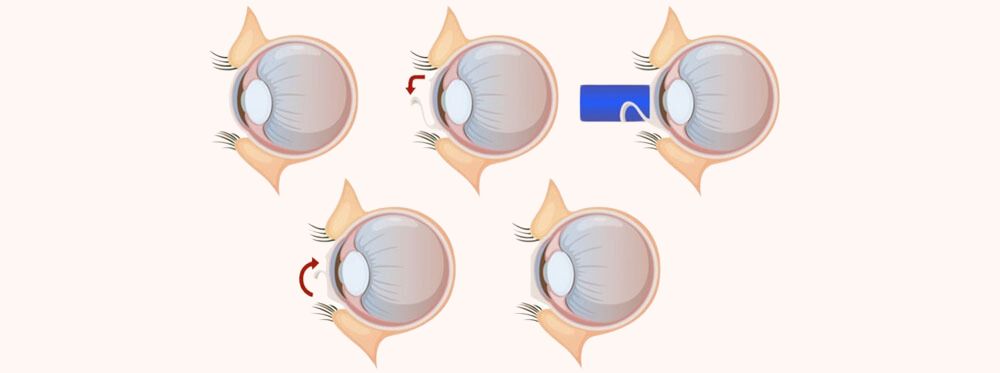
At Laxmi Eye Hospitals & Institute, we have modern facilities and use advanced technologies like LASIK, Contoura Vision, Trans PRK (Touchless and Flapless), SBK, and others to improve vision. These procedures use laser energy to fix the size or shape of the cornea, making vision better. If laser surgery isn't suitable, we also offer an alternative called Phakic IOL (ICL/IPCL).
Contoura Vision in Navi Mumbai
Tailored for those with astigmatism, Contoura Vision treatment integrates prescriptions with corneal topography maps, elevating the quality of vision. Boasting over a 90% satisfaction rate, this treatment ensures sharper vision than with conventional glasses.
Advantages of Contoura Vision
A personalized treatment plan derived from corneal topography maps.
Precision in correcting refractive irregularities and corneal errors.
Addressing higher-order aberrations and irregular astigmatism
Achieving sharper, clearer vision with enhanced detail.
Superior overall visual performance, encompassing clarity, contrast sensitivity, and night vision.
Elimination of induced aberrations, preserving or enhancing the natural quality of vision.
Stability and predictability of outcomes.
Applicability to a broader patient spectrum, including those with complex refractive issues or prior corneal surgeries.
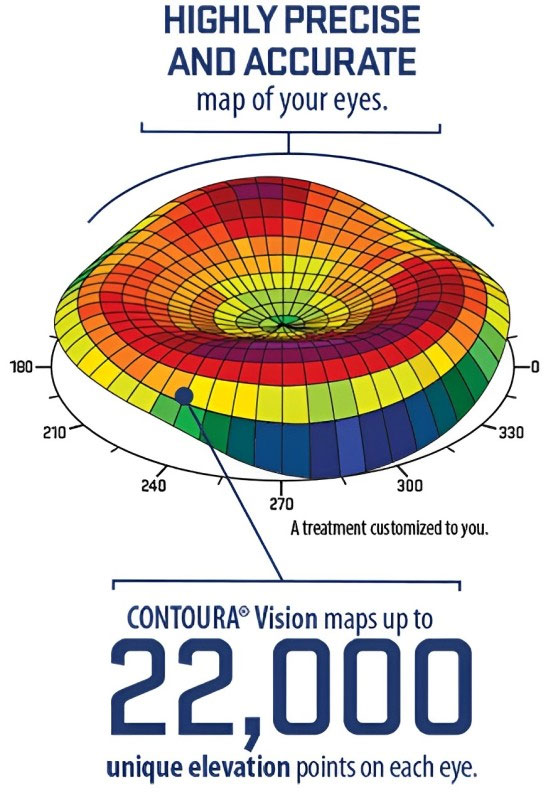
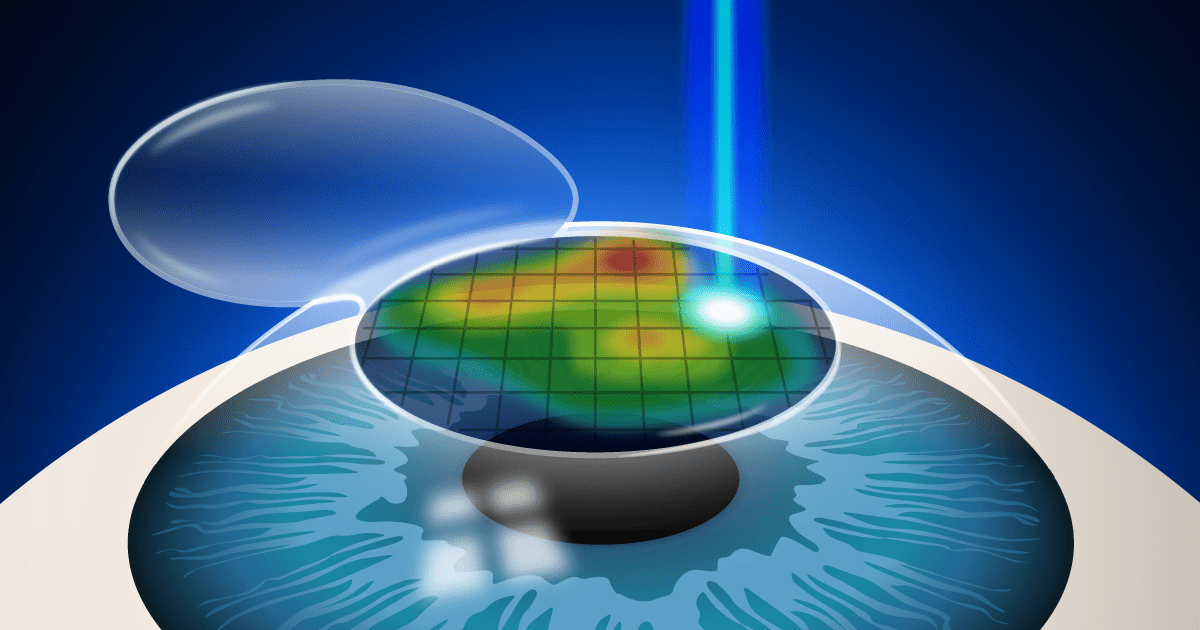
Procedure Overview
Commencing with a meticulous ocular examination, followed by preoperative tests gauging corneal curvature and thickness, eligibility is determined. Detailed fundoscopy identifies any retinal pathology, treated if found, followed by scheduling LASIK after 1 to 4 weeks. On surgery day, topographic scans guide the customization of treatment plans, utilizing Bladeless Femtosecond technology for corneal flap creation and Amarys 500 excimer laser for refractive correction. Post-operative care includes scheduled check-ups on the first day and one month later.
Femtosecond LASIK in Navi Mumbai
Femtosecond LASIK, a prevalent refractive technique, involves corneal reshaping using a precise laser. Distinguished as bladeless LASIK, it leverages two types of lasers for optimal precision in correcting myopia, hyperopia, and astigmatism.
Femtosecond LASIK Procedure
The femtosecond laser initiates corneal flap preparation, with an excimer laser subsequently addressing visual anomalies. A unique contact glass aids laser pulse passage and post-cut, the flap is folded to expose the cornea's stromal bed.
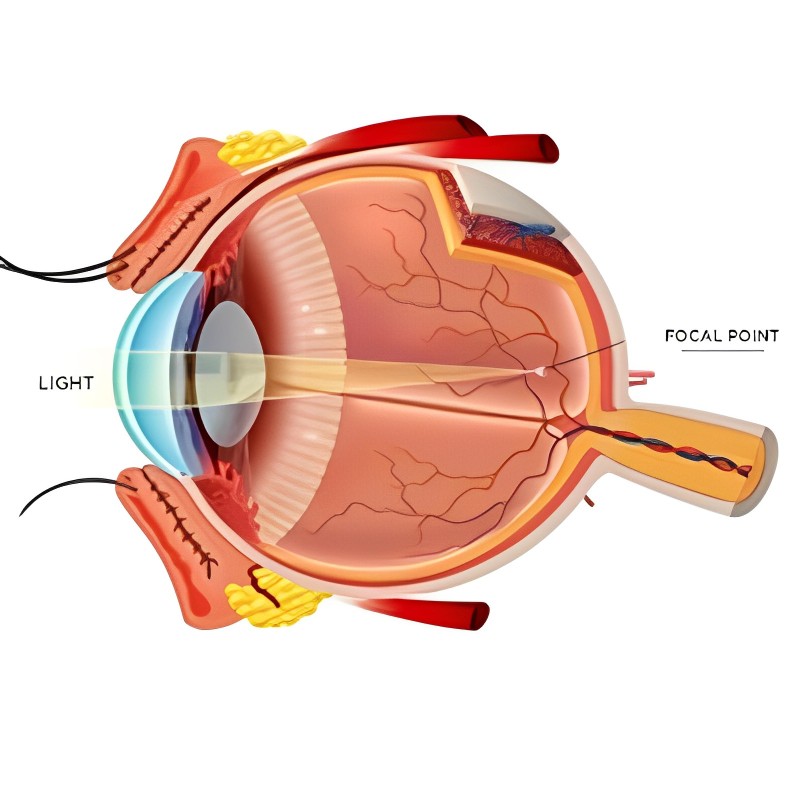
Myopia (Near-Sightedness) Correction
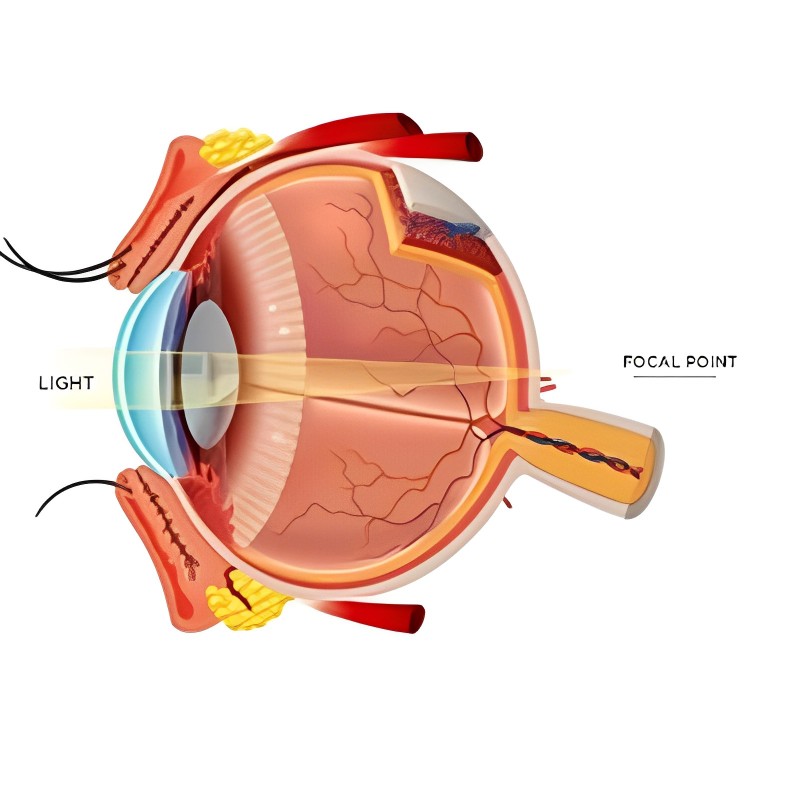
Hyperopia (Far-Sightedness) Correction
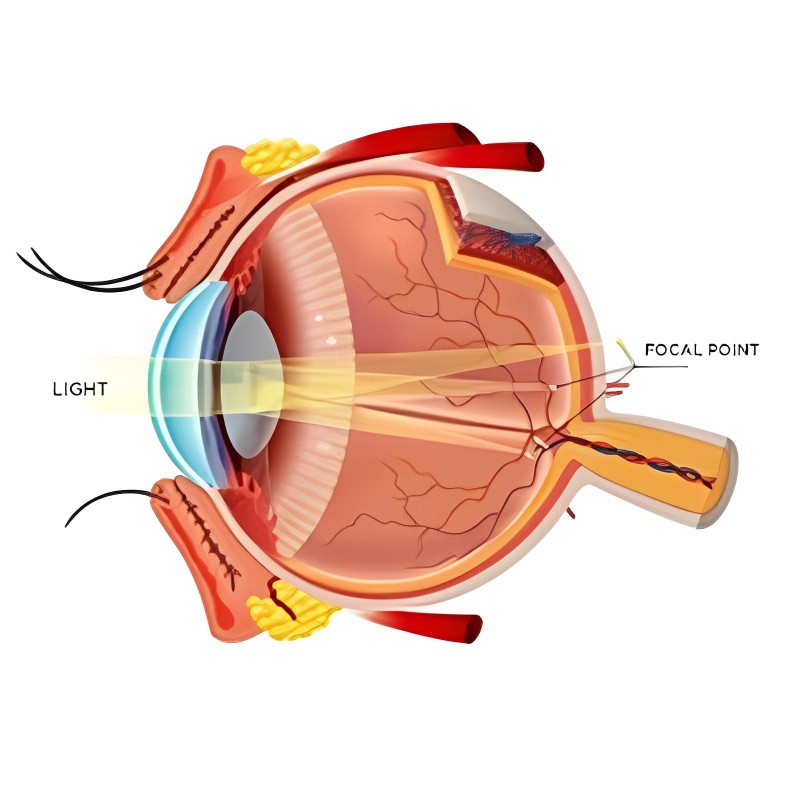
Astigmatism Correction
The excimer laser then rectifies nearsightedness, farsightedness, or astigmatism.
Advantages of Femtosecond LASIK
Bladeless procedure: Eliminates the need for conventional surgical blades.
Heightened safety :Thin corneal flap creation minimizes complications.
Individualized treatment :Tailored plans align with the patient's unique eyesight and refractive error.
Expedited healing :Laser-generated flaps facilitate swift recovery, reducing post-operative risks.
Enhanced precision :Superior laser precision ensures accurate corneal flap creation and optimal visual outcomes.
Reduced flap-related complications :Diminished risks of imperfections like wrinkles, striae, or dislocation.
Improved visual acuity :Advanced technology contributes to heightened vision acuity, reduced glare, and overall visual enhancement.
Patient comfort :Bladeless methodology, coupled with swift and precise flap creation, enhances patient comfort.
Versatility :Effective treatment for various refractive issues, including hyperopia, myopia, and astigmatism.
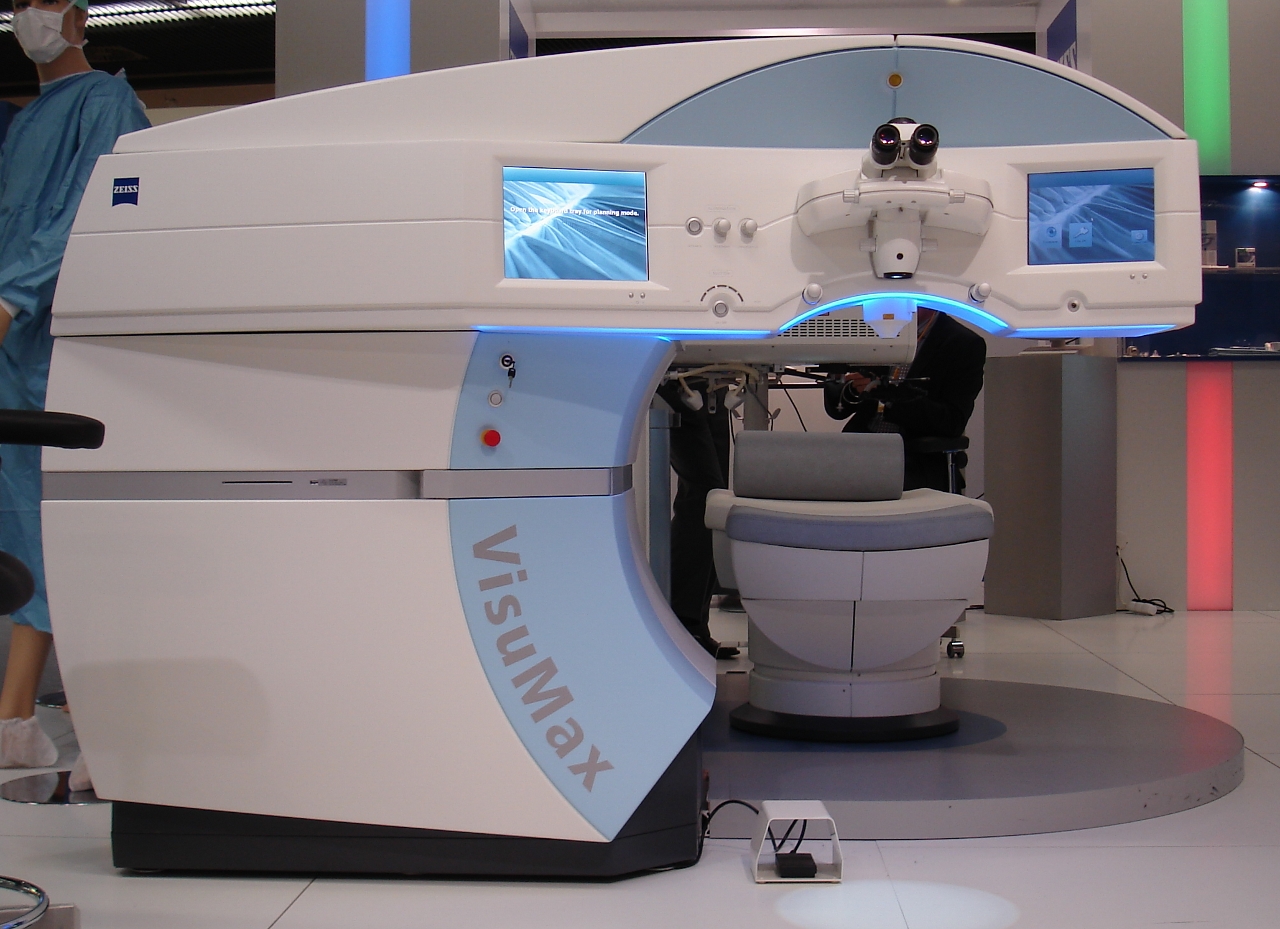
Trans PRK: Touch-Free Laser Refractive in Navi Mumbai
Trans PRK, or Transepithelial Photorefractive Keratectomy, stands as a technique enabling laser access and corneal reshaping without flap creation.
Suitability Criteria
The corneal thickness should be a minimum of 485 microns.
Myopia prescriptions up to -10 diopters, hyperopia up to -4 diopters, and astigmatism up to -5 diopters.
Surface-based laser refractive procedure without corneal flap formation.
Trans PRK Advantages
Surface treatment approved by the FDA, omitting corneal flap creation.
Procedure without a flap, eliminating risks associated with flaps.
Enhanced safety, minimizing risks like epithelial ingrowth or flap dislocation.
Predictable outcomes, utilizing advanced laser technology for precise corneal alterations.
Tailored treatment plans align with individual eye anatomy and refractive error.
Reduced postoperative discomfort compared to flap-involved procedures.
Effective correction for various refractive errors, including myopia, hyperopia, and astigmatism.
Significant reduction in the risk of corneal Ectasia, a condition marked by weak and deformed corneas.
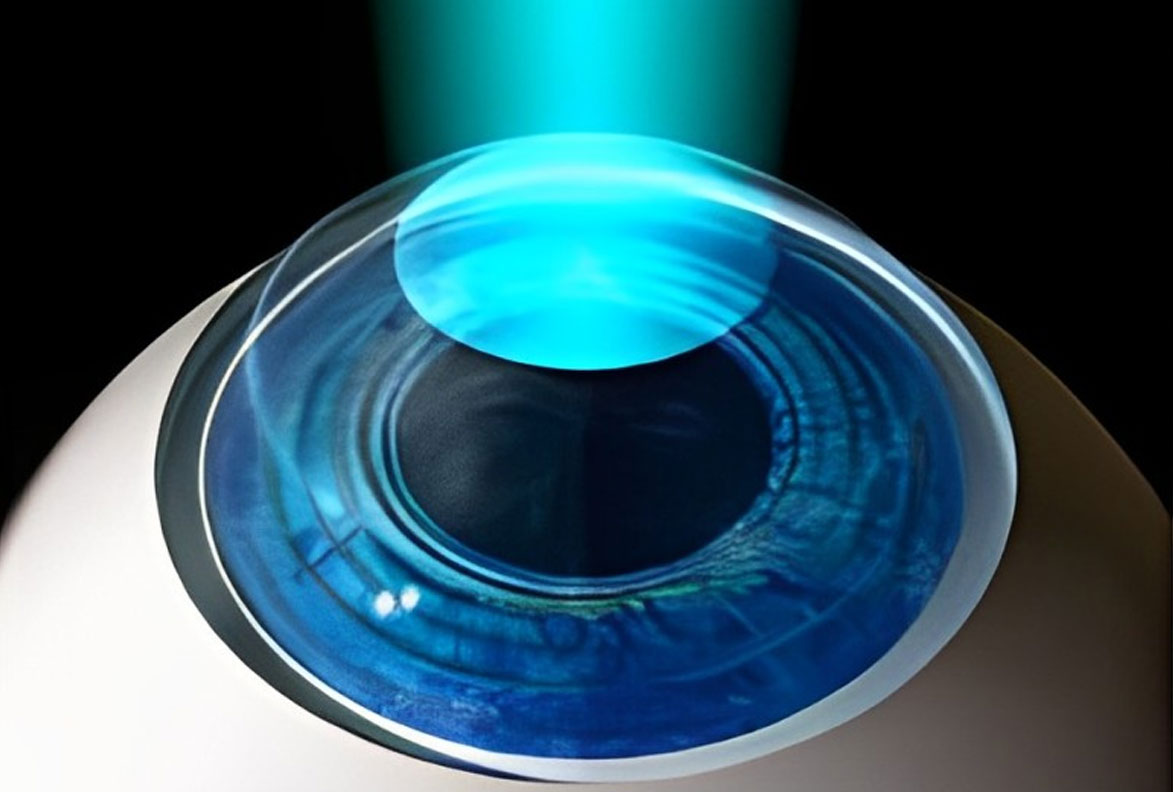

Procedure Overview
The Trans PRK procedure is a swift and innovative laser eye surgery, it begins with a thorough pre-procedure consultation to address individual concerns. On the day of the surgery, patients wear a special gown for cleanliness. Following the administration of local anesthesia, the eyes are focused on a gentle green laser light, which precisely removes surface cells without the need for a corneal flap. The post-surgery period involves wearing a protective contact lens to aid healing. Essential check-ups at one day, three days, one week, one month, three months, and six months, with special attention for strong nearsightedness cases, ensure the proper monitoring of recovery and vision improvement. Comprehensive post-operative care, recovery guidelines, and educational resources are provided to support patients throughout their Trans PRK journey, promoting optimal outcomes and a comfortable healing process.
Implantable Contact Lenses (ICL) in Navi Mumbai
ICL, or Implantable Contact Lenses, entails the implantation of a contact lens into the eye to correct errors and enhance vision. Crafted from highly biocompatible material, this lens sits atop the natural lens, directing light onto the retina.
ICL Advantages
Superior visual sharpness and quality correction across various refractive errors.
Versatile correction options for moderate to severe nearsightedness and farsightedness.
Outpatient procedure lasting 15 minutes per eye with rapid recovery.
Adjustable and reversible, allowing changes in vision correction.
Maintains natural cornea shape, facilitating future treatments.
Stable, healthy vision with maintained contrast sensitivity and quality.
Suitability for those with thin-walled corneas ineligible for other refractive surgeries.
Minimal dryness and discomfort post-treatment due to non-corneal involvement.

ICL Procedure
Preoperative tests evaluate eye characteristics, followed by eye numbing and dilation. A small corneal opening facilitates lens insertion, with subsequent adjustments ensuring proper positioning. Immediate post-procedure vision improvement is common, with prescribed eye drops preventing infection. Postoperative check-ups verify the correction.
Patient Testimonials: Real Stories, Real Success
Hear how our dedicated team at Laxmi Eye Hospital has transformed lives with expert care and compassionate treatment.
Meet our LASIK Surgeon: Dr. Tanvi Haldipurkar
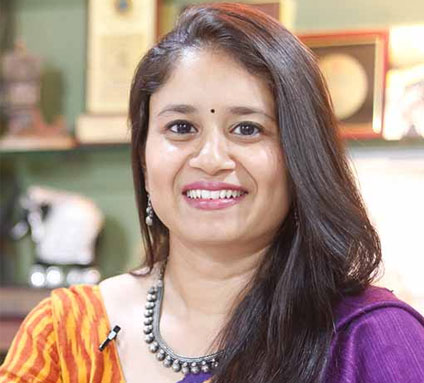
Dr. Tanvi Haldipurkar
Ophthalmologist Navi MumbaiDr. Tanvi Haldipurkar, our esteemed ophthalmologist, specializes in painless Bladeless Cataract surgery in Navi Mumbai, at Laxmi Eye Institute & Hospital, an internationally recognized eye hospital with centres at Panvel, Kharghar, Kamothe, and Dombivali. Dr. Haldipurkar ensures unparalleled eye care and vision correction in Navi Mumbai.
Criteria for LASIK Selection in Navi Mumbai
Beginning on the LASIK surgery in Navi Mumbai demands individuals to meet specific criteria:
Age 18 years or older.
Stable refractive error correctable to 20/40 or better.
Normal ocular health, with exclusions for certain conditions.
Absence of specific auto-immune diseases compromising natural healing.
Non-pregnant or nursing individuals.
Controlled diabetes for eligibility.
Myopia from -1.00 to -15.00D and astigmatism < 8.00 D.
Pupil size < 6mm (in room light).
Realistic expectations of final results.

Preoperative Assessments Include

Dry eye evaluation

Night vision and contrast sensitivity tests
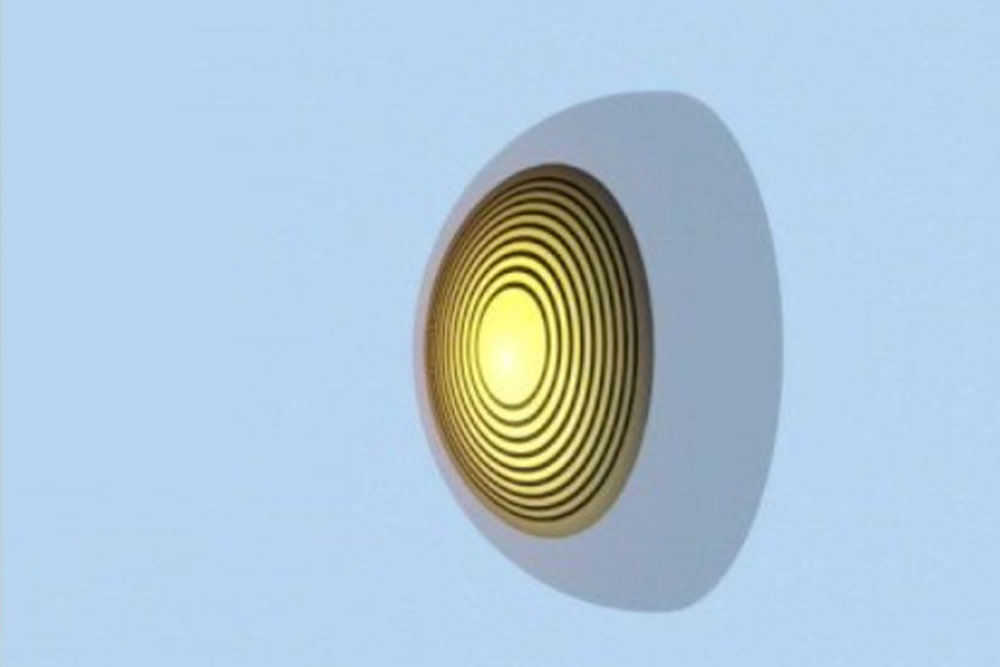
Corneal topography

Dilated retinal examination
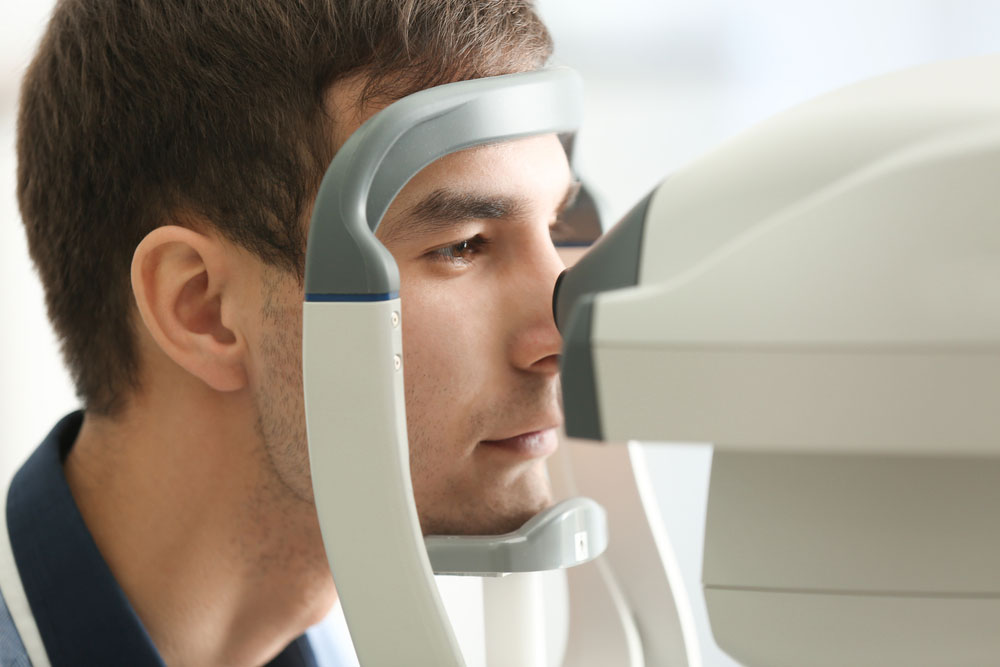
Pupil size and intraocular pressure checks
LASIK Surgery Safety Assurance
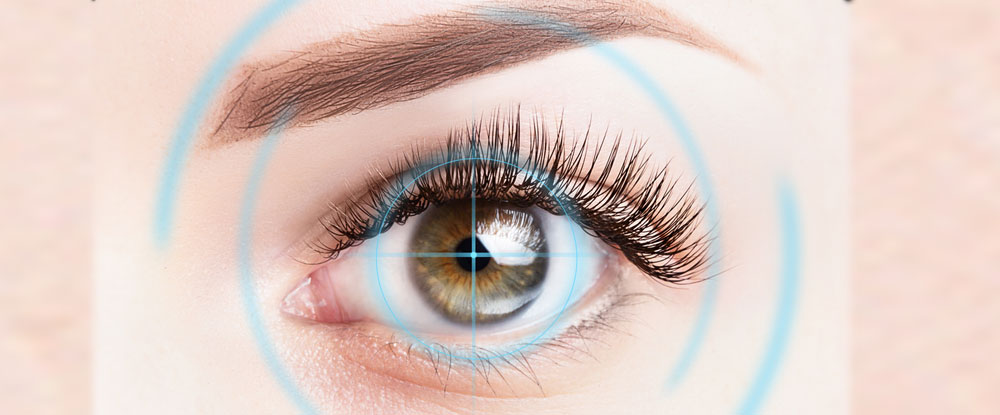
Proven Security :LASIK stands as a reliable elective surgical procedure with a track record of over three decades.
Clinical Backing :Robust clinical evidence supports the safety and effectiveness of LASIK for eligible candidates.
Post-LASIK Visual Expectations
While LASIK typically enhances distance vision to match or exceed that of glasses, complete freedom from glasses or contacts hinges on several factors:
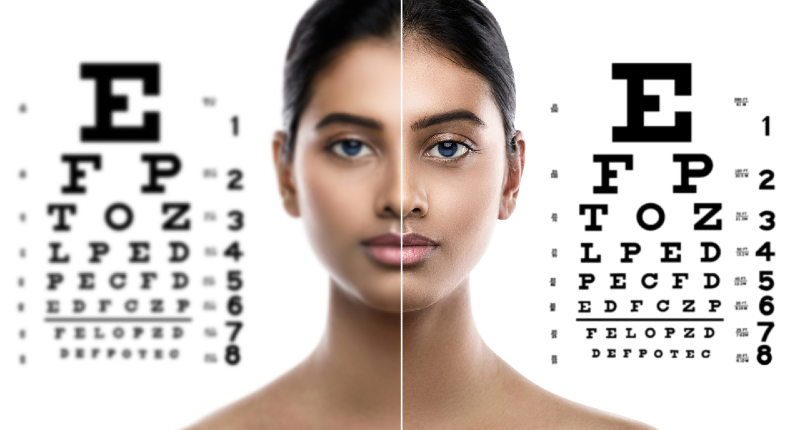
 Prescription strength and refractive error type.
Prescription strength and refractive error type. Surgeon experience and the availability of advanced laser technology.
Surgeon experience and the availability of advanced laser technology.
Conclusion
The journey to visual liberation commences with LASIK, offering a safe and effective solution for eligible candidates at Laxmi Eye Institute & Hospital, the best eye hospital for LASIK eye surgery in Navi Mumbai with centres at Panvel, Kharghar, Kamothe, and Dombivali. In the landscape of ocular enhancement, LASIK surgery emerges as a beacon of visual clarity, masterfully conducted by the best LASIK Surgeon, Dr. Tanvi Haldipurkar at Laxmi Eye Hospitals & Institute in Navi Mumbai.
Important FAQs on LASIK in Navi Mumbai
-
Q. 1What is LASIK Surgery?
LASIK (Laser-Assisted In Situ Keratomileusis) is a popular refractive surgery to correct vision problems. It involves reshaping the cornea using a laser.
-
Q. 2Is LASIK Safe?
LASIK is considered safe and effective for the majority of patients. However, like any surgery, there are potential risks and side effects. Your surgeon will discuss these during the consultation.
-
Q. 3Am I a Suitable Candidate for LASIK?
Candidates should be over 18, have stable vision for at least a year, and not have certain health conditions. A thorough eye examination will determine eligibility.
-
Q. 4How Long Does the Procedure Take?
The actual laser part of the surgery usually takes around 10-15 minutes per eye. However, you should plan for a few hours at the clinic for pre-op and post-op procedures.
-
Q. 5Does LASIK Hurt?
Most patients experience little to no pain during LASIK surgery. Numbing eye drops are used to ensure comfort.
-
Q. 6What is the Recovery Time?
While some improvement is often noticed immediately, full visual recovery may take a few days to weeks. Most patients can resume normal activities within a day or two.
-
Q. 7Are the Results Permanent?
LASIK provides long-lasting results, but individual cases may vary. It doesn't prevent age-related vision changes, so reading glasses may still be needed in the future.
-
Q. 8What Are the Potential Risks?
Risks include dry eyes, glare, halos, and, in rare cases, infection. Your surgeon will discuss these risks during the consultation.
-
Q. 9How Much Does LASIK Cost?
The cost of LASIK surgery can vary. It is essential to get a detailed breakdown of costs during the initial consultation.
-
Q. 10Can Both Eyes Be Treated on the Same Day?
Yes, many patients have both eyes treated during the same session for convenience and quicker overall recovery.
Ready to Say Goodbye to Glasses?
Take the First Step Towards Clear Vision
Book Your LASIK Evaluation Now!All Copyright© Reserved @ Laxmi Eye Hospital And Institute
